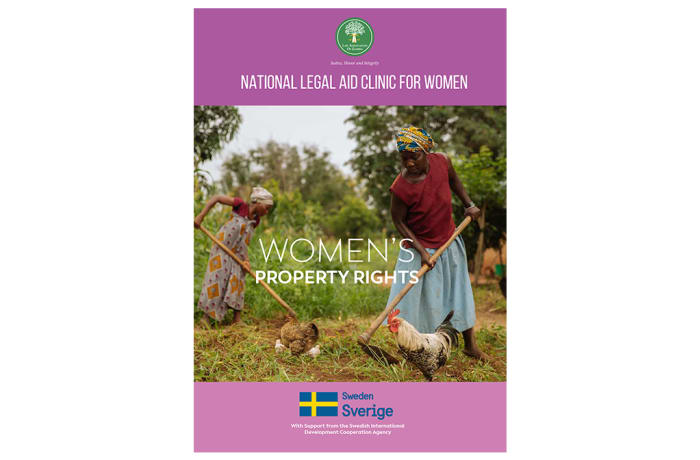
Women's Property Rights Booklet
Further information
WHAT IS A RIGHT?
A Right is a moral or legal entitlement a person has or claims from the society in which that person lives.
WHAT IS PROPERTY?
Property is anything that is acquired by the person and has value. This may be movable or immovable. It also includes the person’s intelligence or the products of a person’s intelligence or the products of a person’s intellect. This is also known as intellectual property. It is important to remember that there is value attached to this property.
WHO CAN OWN PROPERTY?
Generally, anyone can own property. However, when it comes to owning land, a person must be above the age of 21. Children of tender years may also own property through inheritance, but this is held in trust for them until they become adults.
WHAT ARE WOMEN’S PROPERTY RIGHTS?
This means that a woman has the right to own property without discrimination.
WHEN CAN A WOMAN OWN PROPERTY?
A woman can own property in her own right at all times because there is no law restricting her from doing so. A woman is a human being just like a man and can own property according to the rules laid down under the law. This means that women can get property in their own right, own it and inherit it. A woman can therefore own property, in marriage, as part of her inheritance, at the end of a marriage and as a single woman. She can also own both statutory and customary land and intellectual property.
a). IN MARRIAGE
A woman is an equal partner to a man in a marriage. Therefore, she has an equal opportunity to own property in her own right or together with her husband. She owns the household goods together with her husband. She is also joint owner of any land or houses that she and her husband got together during the marriage, whether they are registered in her name or not. Because they are married, she has the right to the property acquired during that marriage. It is a fact that properties in many marriages are bought using money earned by the man because he is the bread winner in many cases while the woman is a housewife. It is also a fact that even if the woman contributed financially to the acquisition of the properties, it is usually always registered in the man’s name alone. A woman’s contribution to the marriage cannot easily be computed in monetary terms. It is the total sum of her presence in this marriage that entitles her to the property.
b). AT DIVORCE
A statutory and religious marriage is a union between one man and one woman for life, whereas a customary marriage is between a man and one or more women. Under customary law, when there is a divorce only personal items used between the man and the woman will be shared. Communal property is not shared because the other women still in the matrimonial union will continue to use them. Under statutory law, a man and a woman are equal partners and therefore entitled to up to half of the properties acquired in the marriage. What the divorced woman is entitled to depends on a number of factors including:
- contribution;
- duration of the marriage;
- standard of living enjoyed during the marriage;
- age and state of health; and
- financial responsibilities and obligations.
How the property is shared under a customary marriage used to depend on the customs and traditions under which the couple was married. According to the Courts, this position has changed and property can now be shared equally. Previously at a divorce, a woman was usually restricted to kitchen utensils as her share. There is now a shift from this position, as women’s rights have now gained prominence.
c). AT DEATH OF SPOUSE OR PARENT (INHERITANCE)
By law, a married woman is entitled to inherit her late husband’s property. So, when a spouse dies, the surviving spouse and children are entitled to property belonging to the deceased. This includes any houses, land, money, clothes or cars to name a few.
d). AS A SINGLE WOMAN
There are no restrictions on the property that can be held by a single woman. So she can own movable property such as cars, computers or jewellery. She can also own immovable property like land, houses or even trees attached to the ground.
e). RIGHTS OF A WOMAN TO OWN LAND UNDER STATUTORY AND CUSTOMARY LAWS
Women are entitled to own land. The law provides that any person can acquire land as long as they meet the basic minimum requirements. These requirements would include age and the resources to develop the piece of land. Statutory law does not discriminate against any sex when it comes to land acquisition. A woman can apply for land and can acquire land once certain conditions are met. Women have further been advantaged by the favourable land policy which entitles women to thirty per cent of the advertised land and then fair competition with men in the remainder seventy per cent. Under the law public and private bodies must also make sure that woman have the same rights as men when it comes to the allocation of land. Customary land is traditional land held by traditional rulers in a chiefdom. Customary law usually favours men when it comes to land acquisition but this trend is slowly changing.
Traditional land can also be acquired through inheritance regardless of sex. The constitution prohibits any form of discrimination in relation to land acquisition and ownership.
f). WOMEN AND INTELLECTUAL PROPERTY
A woman has the right to register and patent any invention that she may have made. These could include songs, music, inventions and so on. There is no law that prevents women from owning intellectual property rights.
Learn more by downloading a pdf version of this booklet. Copy and paste this link into your browser:
https://res.cloudinary.com/dhsjpmqz9/image/upload/v1685345199/5._WOMEN_S_RIGHTS_vi8qpm.pdf
